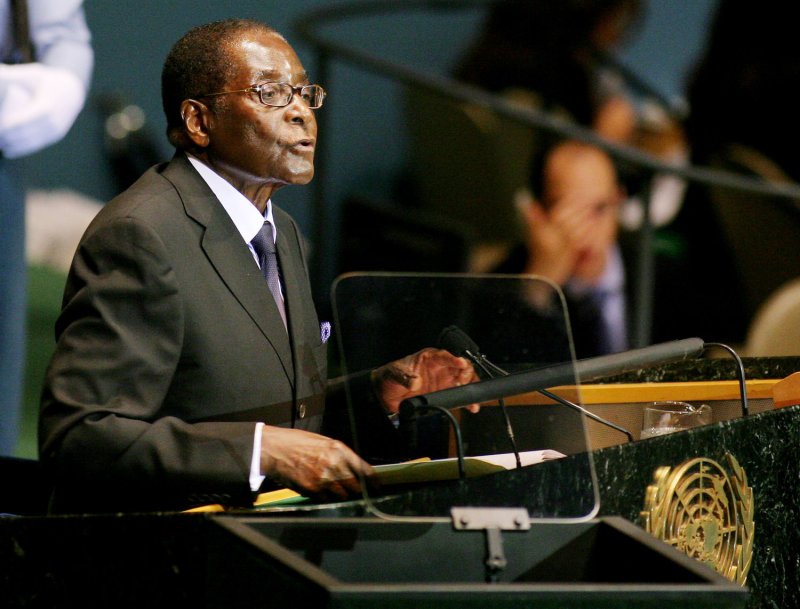President of Zimbabwe Robert Mugabe addresses the 64th General Assembly at the United Nations on September 25, 2009 in New York City. UPI /Monika Graff |
License Photo
HARARE, Zimbabwe, March 3 (UPI) -- Zimbabwe's leader, independence hero Robert Mugabe, is struggling to cling to power even though he has driven his once-prosperous country to bankruptcy and the way he's doing it is selling diamonds many see as mined at gunpoint.
Mugabe, who has been in power for 31 years, may be getting help from an unlikely source, the diamond industry's own watchdog group known as the Kimberly Process.
This organization, which has headquarters in South Africa, has moved to legalize sales from Zimbabwe's 150,000-acre Chiadzwa diamond field controlled by Mugabe's military.
Two years ago, Zimbabwean diamonds were banned amid allegations of human rights abuses by the military at Chiadzwa and the neighboring Marange field.
Some 200 miners were reported killed at Marange when the army seized control of the fields and, by various accounts, forced men, women and children to dig for diamonds under conditions of slavery.
Having driven Zimbabwe to ruin since he led the former British colony of Rhodesia to independence after a long guerrilla war with a white settler regime, Mugabe is dependent on diamond exports, including large amounts smuggled out by his generals, to stay in power.
First and foremost, Mugabe, 86, needs the funds to keep the military and the ruling Zanu-PF party behind him.
During the 1990s, he systematically eliminated political opposition and turned Zimbabwe into a one-party dictatorship and relied heavily on electoral fraud and intimidation to stay in power.
However, after disputed elections in 2008 he was forced to enter into an uneasy coalition with his main political rival, reformist Morgan Tsvangirai to secure international aid.
In January, with the economy hitting rock bottom, Mugabe called on his party to prepare for elections this year. For that, he needs money, and lots of it. Tsvangirai's Movement for democratic Change insists that a fair and violence-free election cannot be held until a new reformist constitution has been agreed.
Pro-democracy activists want the vote postponed until 2013. But Mugabe is pushing for a 2011 election, as evidenced by the state sharply increasing the distribution of seeds and food in rural regions.
That, an African diplomat observed, "is a classic sign an election is looming."
The Marange mine in Zimbabwe's Eastern Highlands was discovered in 2006, the third such field found in the region. It's considered one of the richest in the world, producing 6 million carats a year worth up to $100 million a month.
It was run by the British-registered African Consolidated Resources but Mugabe revoked its license and, amid allegations of fraud, Marange was taken over by two new companies linked to leading figures in the regime.
Mugabe seized the fields after the 2008 elections in which ZANU-PF were badly hurt.
On Oct. 27, he launched Operation Hakudzokwi Kumunda -- or "No Return" -- with 800 troops backed by five strafing helicopter gunships. The military also took over the smuggling operations.
The 300-member Kimberly Process was set up primarily to halt the trade in "blood diamonds," stones sold by African warlords to finance conflict in countries like Angola, Congo, Sierra Leone and Liberia in which 4 million people perished.
The watchdog group stepped in and banned the sale of Zimbabwean diamonds in 2009. But Mugabe's regime argued that its sales did not fall into the category of "conflict diamonds."
Eventually, after what many called underhand methods by the regime, the Kimberly group approved diamond auctions by the Harare regime. Many in the diamond industry, particularly in the liberal West, were dismayed.
But it was clear that new, less scrupulous elements, including the rising economic powers of China and India, were emerging in the industry to challenge the old order.
"With world diamond production falling by 24 percent since 2009, and increased competition, buyers were becoming readier to push human rights and governance standards aside," the International Crisis Group said in a November report.
"Marange is already a major producer and new deposits are still being discovered in the country, so Zimbabwe's importance as an exporter is likely to grow.
"In an environment in which some governments of diamond-producing countries are reluctant to comply fully with the KP standards, and some governments of diamond-buying countries are willing to ignore the contribution the diamond trade is making to insecurity, human rights violations and conflict, the KP's regulator role is being challenged."















